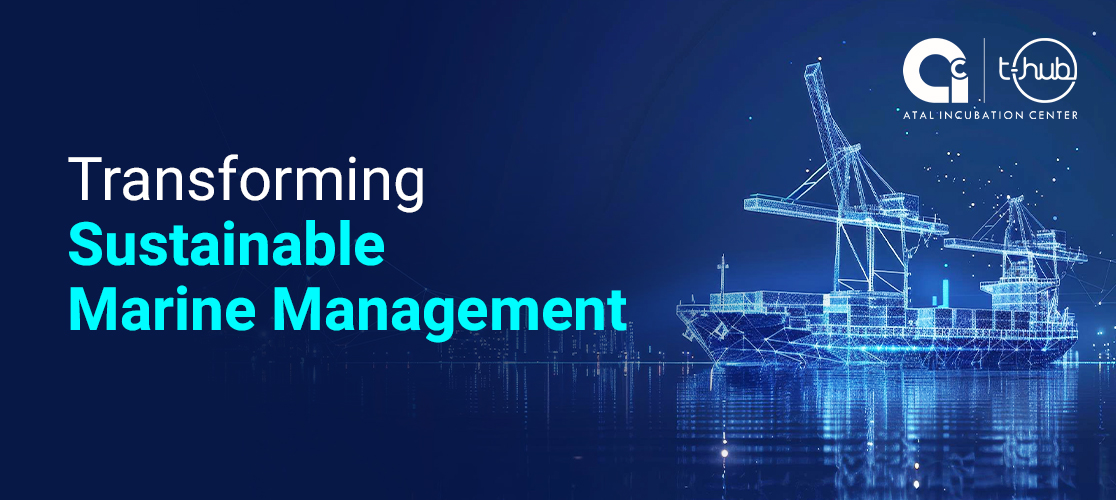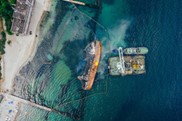
Atal Incubator at T-Hub Ignites the Surge of Indian Startups to Global prominence
A supportive entrepreneurial ecosystem acts as an alchemist, moulding raw potential into success. Incubators, mentors, investors, and collaborators are vital in guiding startups through challenges. Enter India, a hub entrepreneurial spirit, where the Atal Innovation Mission (AIM) by the Indian Government has ignited innovation.
- World-class Innovation Hubs
- Grand Challenges
- Start-ups
- Self-Employment Activities

A Brief History and Challenges of the Government
In 2019, government spending on healthcare in India amounted to $36 billion, constituting 1.23% of the GDP. However, in 2020–21, India allocated 1.8% of its GDP to health. Beyond healthcare, India plays a crucial role in global agriculture, providing livelihoods for about 55% of its population. Additionally, it stands as the fourth-largest electricity consumer globally and the third-largest producer of renewable energy, with 40% of the installed capacity sourced from renewable sources in 2022. Despite challenges, India maintains a total literacy rate of 77.70%, a significant achievement attained over a prolonged period.
To bridge the gap between academia and industry, AICs actively engage in collaborations with universities and research institutions, transforming research into commercially viable ventures. These partnerships connect startups with mentors, who provide invaluable guidance and expertise.
AICs’ Comprehensive Impact on Entrepreneurial Growth

A robust support system forms the backbone of AICs, offering co-working spaces, state-of-the-art prototyping facilities, financial assistance, and expert mentorship across diverse sectors. This comprehensive assistance spans every stage of a startup’s journey, from ideation to scaling, encompassing specialized incubation programs, acceleration initiatives, skill-development workshops, and networking events. Telangana’s thriving entrepreneurial ecosystem, exemplified by centres, such as T-Hub in Hyderabad and Atal Incubation Centre (AIC T-Hub), focuses on specific sectors such as IT, Mobility, Semiconductors, Healthcare, Emerging technologies, Agriculture, and Food processing, amplifying the impact of innovation and entrepreneurship in the region.
Beyond providing physical resources, AIC empowers startups with holistic guidance, offering mentorship, networking opportunities, skill development, and crucial access to funding. Recognizing that startups require seed funding, grants, and access to investor networks for sustained growth, AIC facilitates government funds, corporate sponsorships, and strategic partnerships. This multifaceted support not only nurtures startups but also contributes significantly to job creation, fostering an innovation culture, bridging academia-industry gaps, and empowering underprivileged communities.
AIM’s Vision for Entrepreneurial Excellence in India Through Network of AICs
With a record of accomplishment of supporting over 3,500 startups, creating 32,000 jobs, incubating more than 2,900 startups, and facilitating over ₹1,000 crore in funding, AICs demonstrate their pivotal role in shaping a vibrant entrepreneurial landscape. Notably, the focus on supporting women-led startups underscores AICs’ commitment to inclusivity and diversity, marking a key aspect of their impact on the startup ecosystem.
Cultivating Entrepreneurial Habits:
- AIC’s mission centres on cultivating entrepreneurial habits that includes . promoting problem-solving mindsets, resilience, risk-taking, strong work ethics, continuous learning, and network building. This focus not only shapes businesses but fosters a community of innovative individuals.
- Expanding AIC’s tech landscape:
India’s tech landscape reflects diverse innovations, from AI-powered healthcare diagnoses to smart-city infrastructure, ushering in a transformative shift. With 15 new AICs established across India, their reach expands, fostering innovative ideas in diverse regions and creating a robust network of 75 operational AICs nationwide.
- Funding and Investments:
- AIM’s emphasis on funding and investment, with ₹350 crore earmarked for incubated startups, plays a pivotal role in nurturing startups towards growth.
Pioneering Solutions Across Industries:
- In healthcare, AICs pioneer solutions for telemedicine, remote diagnostics, and personalized healthcare. Agriculture-focused AICs drive advancements in precision farming, Agri-Tech solutions, and sustainable agricultural practices.
Role of Cleantech:
- Cleantech AICs contribute significantly to developing renewable energy resources, waste management solutions, and environmental sustainability initiatives.
The Global Effect:
- International collaborations form a crucial part of AIM’s strategy, fostering global learning and best practices exchange through partnerships with leading incubators and organizations.
Power of Collaborations:
- Joint programs and initiatives support international startups entering the Indian market, providing global mentorship, and networking opportunities for AIC-backed ventures.
Events and Conventions:
Several AICs actively organize events like hackathons, conferences, and investor pitching sessions, complemented by new initiatives in intellectual property protection, market access, and business development.
Transforming Sustainable Marine Management
Encompassing more than 70% of the Earth surface, our oceans are a vast expanse brimming with life, providing essential resources for humankind. The global seafood industry, accounting for 287 million jobs and USD 244 billion in annual first-sale value, heavily relies on the bounty of our oceans. Yet, this complex ecosystem confronts unprecedented challenges, from overfishing and pollution to the impact of climate change.

Up to 31 per cent of commercially fished fish stocks come from overfishing, highlighting the urgent need for sustainable management practices. To secure the health and longevity of our oceans for future generations, innovative solutions are imperative. In this endeavour, sensors and artificial intelligence (AI) are emerging as transformative tools.
By harnessing the power of technology, we can gather crucial data, monitor marine ecosystems in real-time and make informed decisions to ensure the sustainability of our oceans and the prosperity of the communities reliant upon them.
Envision a vast network of interconnected devices spanning the depths of the ocean, collecting real-time data on various aspects, such as water quality, fish populations, salinity, temperature and ocean currents. The interconnected marine ecosystem relies on an intricate blend of advanced sensors and intelligent algorithms.
These technological wonders, nestled within buoys, underwater drones (AUVs), and even fish tags, continuously gather data, offering a comprehensive insight into the ocean & air condition. Consider miniature sensors monitoring dissolved oxygen levels, a crucial metric for assessing marine life health. Similarly, acoustic sensors capture the sounds of whales and dolphins, aiding scientists in monitoring their populations and migration routes. Data-driven decisions for a sustainable future
The data amassed by these sensors represents a valuable repository of information, yet its true potential lies in its analysis and interpretation. By sifting through extensive datasets, AI can discern patterns, forecast trends and unveil insights that would be unattainable through human efforts alone, such as identifying areas for marine protected area (MPA) establishment, tracking illegal fishing and predicting climate change impacts.
This newfound understanding equips stakeholders, ranging from fishermen and policymakers to scientists and conservationists, with the knowledge needed to make informed decisions regarding sustainable marine management. For example, real-time data on fish populations can inform the implementation of quota systems and the establishment of closed fishing seasons to mitigate overfishing. Similarly, insights into water pollution levels can guide the development of waste management strategies and initiatives for environmental conservation.
Stretching from the vibrant shores of Mumbai to the tranquil beaches of Kerala, India boasts a coastline spanning over 7,516 kilometers, nurturing a diverse array of marine life and serving as a vital source of sustenance, livelihoods and economic prosperity.

India is embarking on a groundbreaking journey, charting a path towards digitizing the interconnected marine ecosystem. Much of the pathbreaking work in this field will be led by startups, ecosystem enablers like T-Hub and AIC create a conducive environment for fresh ideas to thrive and take business roots. This transformative approach holds the potential to revolutionise the management of marine resources, fostering a harmonious coexistence between human endeavours and the intricate underwater realm.
T-Hub serves as a pivotal catalyst in fostering a dynamic ecosystem of startups focused on developing innovative solutions for sustainable marine management. By offering funding, mentorship, infrastructure and market access, T-Hub empowers these startups to thrive and make a significant impact. Moreover, T-Hub plays a vital role in bridging the gap between academia, industry and policymakers through workshops, conferences and hackathons.
These collaborative efforts facilitate knowledge sharing, idea generation and the creation of collaborative solutions for sustainable marine management. Also, T-Hub actively supports the development of relevant technologies, such as advanced sensors, AI algorithms and underwater drones (AUVs). By showcasing success stories and raising awareness about the potential of technology in this domain, T-Hub contributes to accelerating India’s journey towards a connected marine ecosystem. In doing so, T-Hub is instrumental in paving the way for a more sustainable and harmonious relationship between humanity and the ocean.
One such example is Aquaconnect, a startup backed by T-Hub, which uses AI to establish direct connections between fish farmers and consumers. The approach mitigates post-harvest losses and enhances market accessibility. Furthermore, Ecocean, another success story nurtured by T-Hub, employs AI-enabled Autonomous Underwater Vehicles (AUVs) to gather up-to-date data on water quality and marine biodiversity. The data contributes significantly to conservation initiatives and effective resource management.
While the potential of interconnected marine ecosystems is vast, obstacles persist. Data security and privacy emerge as pivotal concerns due to the collection and analysis of substantial volumes of sensitive information. Moreover, guaranteeing fair access to technology and its advantages for all stakeholders, including small-scale fishermen, remains imperative.
Notwithstanding these challenges, the opportunities offered by interconnected marine ecosystems are undeniable. Embracing this technological advancement enables us to navigate towards a sustainable future for our oceans, securing their ongoing abundance for future generations. As we embark on this voyage, collaboration, innovation and responsible use of technology emerge as essential elements in achieving sustainable marine management.

